人教版 高中英语 必修一unit3 001 导学案(教师版 学生版)
人教版必修1英语Unit3 Reading for information 导学案
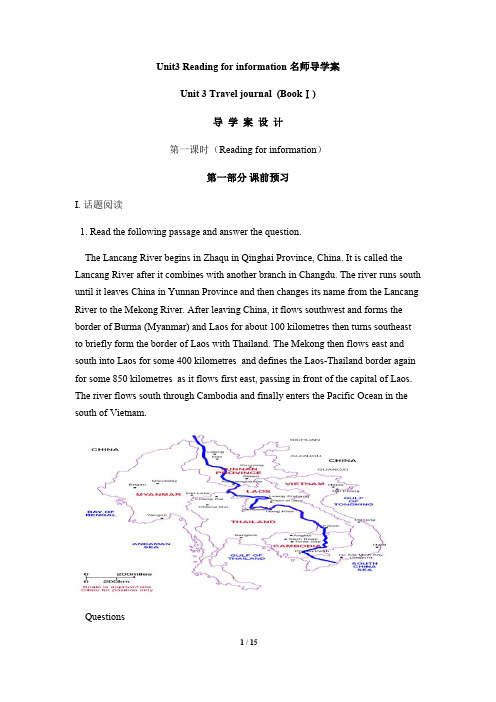
Unit3 Reading for information 名师导学案Unit 3 Travel journal (BookⅠ)导学案设计第一课时(Reading for information)第一部分课前预习I. 话题阅读1. Read the following passage and answer the question.The Lancang River begins in Zhaqu in Qinghai Province, China. It is called the Lancang River after it combines with another branch in Changdu. The river runs south until it leaves China in Yunnan Province and then changes its name from the Lancang River to the Mekong River. After leaving China, it flows southwest and forms the border of Burma (Myanmar) and Laos for about 100 kilometres then turns southeast to briefly form the border of Laos with Thailand. The Mekong then flows east and south into Laos for some 400 kilometres and defines the Laos-Thailand border again for some 850 kilometres as it flows first east, passing in front of the capital of Laos. The river flows south through Cambodia and finally enters the Pacific Ocean in the south of Vietnam.Questions(1)Where does the Mekong River begin?________________________________________________________________ (2)As the longest river in Southeast Asia, how many countries does the MekongRiver flow through? What are they?________________________________________________________________ ________________________________________________________________ 2.Collect information about the great rivers in China and the world, especially the Mekong River.II. 词汇学习1.Write out the words with the help of the information given.(1).diary n →___________ n. 日记→journalist n. 记者(2).cost n.→_________ n. 小费→_________ n. 费用(3).bike n.→_________ n. 自行车→_________ v.骑自行车(4).decide v →__________ v. 决定,确定→__________ adj. 坚决的(5).travel n →_________ n. 航行→trip n.旅行→__________ n. 旅行(6).night n →__________ n. 午夜→_________ n. 中午→noon n. 中午(7) . idea n.→__________ n. 观点,看法→__________ n. 观点,见解;风景(8) . bag n.→________________ n. 书包→__________ n. 小包,包裹(9). mistake n.→fault n. 错误→______________ n. 缺点(10).under prep.→below prep. 在……下方→________ prep. 在……下面第二部分课中互动Step I Lead-in and warming-up引入与激趣I. Talk about your trip in the National Day Holiday.1. Where did you go? How did you go?_______________________ _____________________2. How long did they stay there? How much did they spend?________________________ ________________________3. What did you take for your trip?_______________________________________________________________ II. Compare different kinds of transport and fill the form.I. Pre-reading1. Brainstorm the uses of a river for the people who live along it_____________________________________________________________________________________________________________________________________________________________________2. Match the great rivers in the world with the locations where the rivers lie.Names of river LocationMekong river FranceSeine(塞那河) ChinaNile(尼罗河) RussiaRhine(莱茵河) EnglandCongo(刚果河) EgyptAmazon(亚马逊河) GermanyMississippi(密西西比河) Central AfricaThames(泰唔士河) USVolga(伏尔加河) BrazilII. Reading1.Skim the passage to match the main idea with its paragraph.Para.1 Different attitudes between themPara.2 Their preparation and details about the Mekong RiverPara.3 Their dream2.Fill in the blanks and get the main idea of the text.____________ and his sister _____________ were planning to ____________ down the Mekong River after _______________ from college and they were making ______________ for the trip.3.Scan the text to fill in the form and find out what the plan is.4.Put the sentences about the Mekong River in the proper order.① The Mekong River enters the South China Sea.② The Mekong River begins at a glacier on a Tibetan mountain.③ At first, the Mekong River is small, and the water is clear and cold.④ The Mekong River enters Southeast Asia.⑤ The Mekong River travels across western Yunnan Province.⑥ The Mekong River leaves China.The proper order:______________________________________5. What were their preparations?①They bought ___________________;②They got their cousins _________________________③They found_____________________.Step III Text interpretation-文本解读I. Key words1. Can persuade in paragraph one be replaced with advise?Did Wang Kun buy a mountain bike?2. In the last sentence in paragraph one schedule means _______.A. 时刻表B.日程安排C.节目表D.明细表3. determined in paragraph two means _______.A. 坚定的B. 确定的4. In paragraph three, pace means the _________ at which a river flows.5. In paragraph three, bend is a ______ .A. nounB. verb6. The text introduces Ss to many geographical terms. They are source, ___________________________________________________________________.Ⅱ Further understanding -深层理解1. Read the article carefully and decide whether the following statements are true (T) or false (F).________( 1). Wang kun is a high school student.________( 2). Both Dao Wei and Yu Hang belong to the Han nationality and they grew up in eastern Yunnan province.________ (3). The source of Mekong is in Qinghai province.________ (4). Finally Wang Kun agreed with his sister to cycle with her.________ (5). They found few atlas and books about Mekong River in library.________( 6). Mekong river begins in a glacier on a Tibetan mountain. The water there is clear but not cold.________ (7). Only a small part of the river is in China.________ (8). Although it is not easy to travel along the Mekong River, Wang Wei insisted on doing so.2. Answer each question on Page 19 in SB.3. Make comparison of the attitudes of Wang Kun and Wang Wei and make lists of their similar and different attitudes about the trip.Ⅲ. Difficult sentence structuresTranslate the following sentences from the text and paraphrase them.1. Although she didn’t know the best way of getting to places, she insisted thatshe organize the trip properly.________________________________________________________________ ________________________________________________________________2. She gave me a determined look—the kind that said that she would not changeher mind._________________________________________________________________ _________________________________________________________________3. … my sister does not care about details.__________________________________________________________________4. It makes wide bends or meanders through low valleys to the plains where ricegrows.__________________________________________________________________ __________________________________________________________________ Ⅳ.Emotion & culture1.Why do we always call the river we live along Mother River?(1)________________________________________________________________(2) ________________________________________________________________(3) ________________________________________________________________ 2. Have a discussion:(1). What should we do for our Mother River in face of river pollution?__________________________________________________________________ ___________________________________________________________________ (2). What suggestions will we make for the government?___________________________________________________________________ ___________________________________________________________________3. Debate “Which character do you like, Wang Kun’s or Wang Wei’s? Why? ”4. Make a comparison.Step IV Talking and sharing -讨论与分享(含自我总结与评价)1. Suppose you can have a chance to travel, following the route of only one of the great rivers in the world with your group members. First have a discussion and make a travel plan , then share your plan with the whole class.Which one of the great rivers will you choose?How are you travelling?What will you do before you start?2. What have you learnt in this passage?3. What do you still have problem with?第三部分课后巩固I.缩写改写与复述1. Fill in the blanks.Wang Kun and his sister had ①.________ about taking a great bike trip ever ②.________ middle school. After ③.________ from college,they ④.________ got the chance to make their dream come true. His sister thought of the idea to ⑤.________ along the Mekong River. They both bought expensive bikes. They also got their cousins ⑥.________ in cycling. Wang Wei ⑦.________ that they should find the source and begin their journey there When she heard that the ⑧.________ of the Mekong River is in Qinghai Province,she wouldn’t ⑨.________ her mind. She even felt excited when she knew that their journey would begin at an ⑩.________ of more than 5,000 metres. Before the trip they found a large atlas in the library. From the atlas they knew clearly about the Mekong River.2. Retell the text with the words and expressions given below.dream about, ever since, graduate from, made up one’s mind, cycle, stubborn, determined, change one’s mind, journey, altitude, insistⅡ. 熟读与词汇探究1.Read the reading passage again and find out the meaning of the words and expressions in bold, trying to guess the meaning from the context.2. Complete the table using the geographical terms.The Mekong RiverIII.类文阅读1.Rivers are one of our most important natural resources. Many of the world’sgreat cities are located on rivers, and almost every country has at least oneriver flowing through it that plays an important part in the lives of its people.Since the beginning of history, people have used rivers for transportation.The longest one in the United States is the Mississippi. The lifeline of Egypt is the Nile. To the people of India , the Ganges is great, but it is also importantfor transportation; ships can travel along it for a thousand miles. Other greatrivers are the Congo in Africa and the Mekong in southeast Asia, The greatestof all for navigation(航海), however, is the Amazon in Brail, It is so wide and so deep that large ships can go about two thousand miles upon it.Besides transportation, rivers give food, water to drink, water for crops, and chances for fun and recreation for the people who live along their banks.In order to increase the supply of water for crops, engineers sometimes build a dam across a river and let a lake form behind the dam. Then people can use the water not only to irrigate their fields but also to make electricity for their homes and industries.However, large cities and industries that are located upon rivers often make problems. As the cities grow in size and industries increase in number, the water in the rivers becomes polluted with chemicals and other materials.People are learning the importance, however, of doing more to keep theirrivers clean if they want to enjoy the benefits of this natural resource.2.Search for more information about the Mother River in different countries andcompare them in at least 3 parts, finding out what they have in common and the differences between them.Suggested answers:参考答案:课前预习I. 话题阅读1.(1) It begins in Zhaqu in Qinghai Province, China.(2)6 contries. They are China, Laos, Myanmar, Thailand, Cambodia, andVietnam.II. 词汇学习1. journal; tip; fare; bicycle; cycle; determine; determined; voyage; journey; midnight; midday; opinion; view; schoolbag; parcel; shortcoming; beneath课中互动阅读训练I. Pre-reading2. Match the great rivers in the world with the locations where the rivers lie.Names of river LocationMekong river FranceSeine(塞那河) ChinaNile(尼罗河) RussiaRhine(莱茵河) EnglandCongo(刚果河) EgyptAmazon(亚马逊河) GermanyMississippi(密西西比河) Central AfricaThames(泰唔士河) USVolga(伏尔加河) BrazilII. Reading1.Skim the passage to match the main idea with its paragraph.Para.1 Different attitudes between themPara.2 Their preparation and details about the Mekong RiverPara.3 Their dream2.Wang Kun; Wang Wei; take a bike trip; graduating; preparations .3.Scan the text to fill in the form and find out what the plan is.Step III Text interpretation-文本解读Ⅱ. 1.F F T T F F F T3.1.(1)Rivers have been one of our most important natural resources from ancient times on;(2) Its basin is always the center of politics, economy and culture;(3) It plays an irreplaceable role in the development of society.(4)Rivers have been used for transportation.…4.课后巩固Ⅰ 1.①. dreamed ②. since ③. graduating/graduation ④. finally ⑤. cycle⑥. interested⑦. insisted ⑧. source ⑨.change⑩. altitudeⅡ 2. The Mekong River。
高中英语必修1人教版精品导学案:Unit 3__Travel_Journal
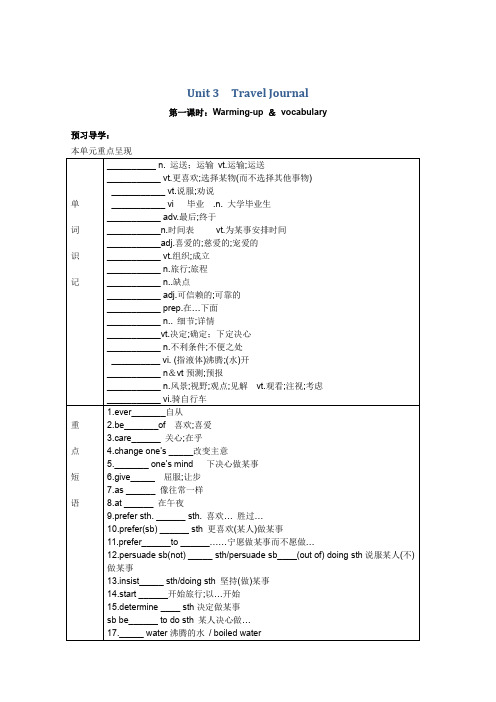
Unit 3 Travel Journal第一课时:Warming-up &vocabulary 预习导学:本单元重点呈现单词识记__________ n. 运送;运输vt.运输;运送___________ vt.更喜欢;选择某物(而不选择其他事物) ___________ vt.说服;劝说___________ vi 毕业 .n. 大学毕业生___________ adv.最后;终于___________n.时间表vt.为某事安排时间___________adj.喜爱的;慈爱的;宠爱的___________ vt.组织;成立___________ n.旅行;旅程___________ n..缺点___________ adj.可信赖的;可靠的___________ prep.在…下面___________ n.. 细节;详情___________vt.决定;确定;下定决心___________ n.不利条件;不便之处__________ vi. (指液体)沸腾;(水)开___________ n&vt预测;预报___________ n.风景;视野;观点;见解vt.观看;注视;考虑___________ vi.骑自行车重点短语1.ever_______自从2.be_______of 喜欢;喜爱3.care______ 关心;在乎4.change one’s _____改变主意5._______ one’s mind 下决心做某事6.give_____ 屈服;让步7.as ______ 像往常一样8.at ______ 在午夜9.prefer sth. ______ sth. 喜欢… 胜过…10.prefer(sb) ______ sth 更喜欢(某人)做某事11.prefer______to ______……宁愿做某事而不愿做…12.persuade sb(not) _____ sth/persuade sb____(out of) doing sth说服某人(不)做某事13.insist_____ sth/doing sth 坚持(做)某事14.start ______开始旅行;以…开始15.determine ____ sth决定做某事sb be______ to do sth 某人决心做…17._____ water沸腾的水/ boiled water18.dream ______ (of) sth 梦见;梦想19.keep _____ sth 继续做某事(强调连续性) keep ___ doing sth. (强调重复性或决心) 20.be familiar _____对…熟悉be familiar ______为…熟悉重点语法有些表示短暂性动作的动词用现在进行时表示按计划,安排将要发生的事情,很少变更,如:来_______;去________;离开______;到达______;开始________ ______;停留_______;归还________;飞行________.等。
高一英语人教版必修一导学案 Unit 3 Travel Journal
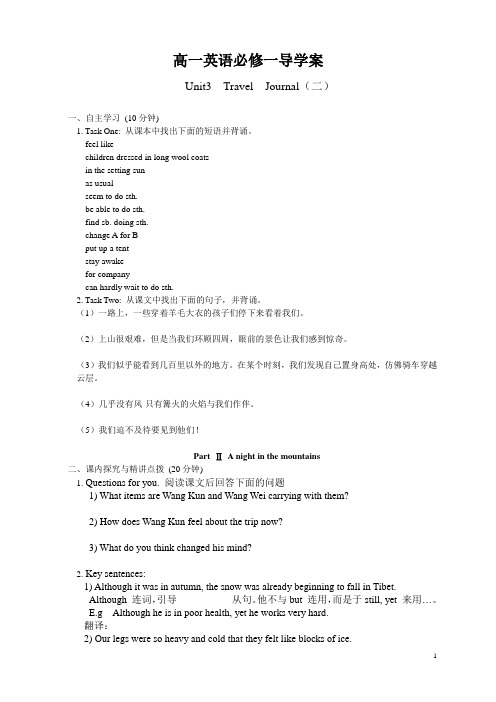
高一英语必修一导学案Unit3 Travel Journal(二)一、自主学习(10分钟)1. Task One: 从课本中找出下面的短语并背诵。
feel likechildren dressed in long wool coatsin the setting sunas usualseem to do sth.be able to do sth.find sb. doing sth.change A for Bput up a tentstay awakefor companycan hardly wait to do sth.2. Task Two: 从课文中找出下面的句子,并背诵。
(1)一路上,一些穿着羊毛大衣的孩子们停下来看着我们。
(2)上山很艰难,但是当我们环顾四周,眼前的景色让我们感到惊奇。
(3)我们似乎能看到几百里以外的地方。
在某个时刻,我们发现自己置身高处,仿佛骑车穿越云层。
(4)几乎没有风-只有篝火的火焰与我们作伴。
(5)我们迫不及待要见到他们!PartⅡA night in the mountains二、课内探究与精讲点拨(20分钟)1. Questions for you. 阅读课文后回答下面的问题1) What items are Wang Kun and Wang Wei carrying with them?2) How does Wang Kun feel about the trip now?3) What do you think changed his mind?2. Key sentences:1) Although it was in autumn, the snow was already beginning to fall in Tibet.Although 连词,引导___________从句。
他不与but 连用,而是于still, yet 来用…。
人教课标版高中英语必修一 Unit3 Listening and Speaking 导学案-新版
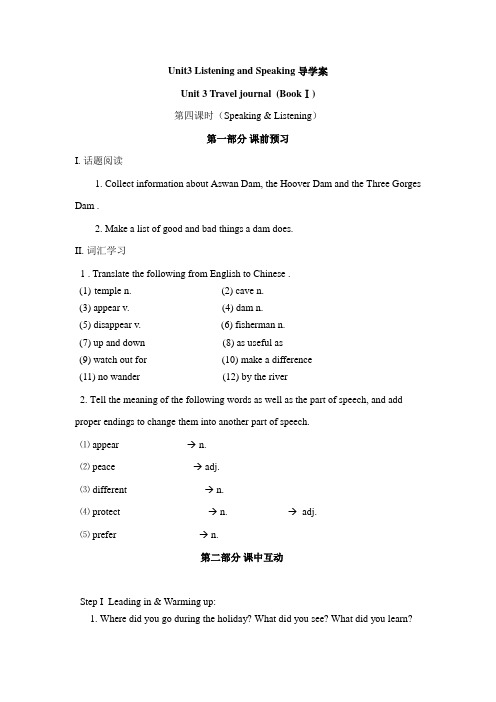
Unit3 Listening and Speaking 导学案Unit 3 Travel journal (BookⅠ)第四课时(Speaking & Listening)第一部分课前预习I. 话题阅读1. Collect information about Aswan Dam, the Hoover Dam and the Three Gorges Dam .2. Make a list of good and bad things a dam does.II. 词汇学习1 . Translate the following from English to Chinese .(1)temple n. ________________ (2) cave n. ________________(3) appear v. ________________ (4) dam n. ________________(5) disappear v. ______________ (6) fisherman n. ______________(7) up and down ______________ (8) as useful as ______________(9) watch out for ______________ (10) make a difference _______________ (11) no wander _______________ (12) by the river _________________2. Tell the meaning of the following words as well as the part of speech, and add proper endings to change them into another part of speech.⑴ appear ___ ________ → n. ___________⑵ peace ____ _________ → adj. __________⑶ different ____ _________ → n. __________⑷ protect ____ ___________ → n. ___________ → adj._____________⑸ prefer ____ ___________ → n. ______________第二部分课中互动Step I Leading in & Warming up:1. Where did you go during the holiday? What did you see? What did you learn?________________________________________________________________ ________________________________________________________________2 Brainstorm as much information about the Yangtze River as possible with thehelp of a map of China.3. Discuss in groups how important the Yangtze River is for the people along the river and list the ways that people use the river.Step II Listening ---Part 3 Chatting with a girlComplete the passage with the information you hear.The Mekong is the most important river in Laos. It even _________ on the national _________ of the country. Laotian people use the river for __________, __________ and __________ goods and people around the country. They call the Mekong “ the ______ of Laos”, but in Tibet, China people call it “ the water of the _________”. If you follow the river in Laos, you can visit temples, caves and a __________. At night, you can sleep in some small _________ by the river.Step III Listening Practice --- Part 5 By the river in Laos1.Discuss in groups , considering what kind of things might happen to change the life on the river, and then list as many things as possible.2. Listen to the tape and complete the table..Ⅰ.功能话题运用1. Complete the following sentences.①The travelers see a girl ____________ (walk) along the road.②Did you know that it ___________ (appear) on our national flag?③I’ve seen boats _________ (go) up and down—they’re ___________ (transport) goods and people.④On our way we saw an old man ___________ (fish) on the Mekong.⑤In the past, The fishermen __________ (catch) many different kinds of fish and __________ (sell) them.⑥I catch enough for my family and I sell _________ is left over to other people. Ⅱ. 类文阅读The Aswan Dam is an embankment dam built across the Nile at Aswan, Egypt between 1898 and 1902. Since the 1960s, the name commonly refers to the Aswan High Dam. Construction of the High Dam became a key objective of the Egyptian Government following the Egyptian Revolution of 1952, as the ability to control floods, provide water for irrigation, and generate hydroelectricity were seen as pivotal to Egypt's industrialization. The High Dam was constructed between 1960 and 1970, and has had a significant effect on the economy and culture of Egypt.Before the dams were built by Nasser, the Nile flooded every year during late summer, when water flowed down the valley from its East African drainage basin.These floods brought high water and natural nutrients and minerals that annually enriched the fertile soil along the floodplain and delta; this had made the Nile valley ideal for farming since ancient times. Because floods vary, in high-water years the whole crop might be wiped out, while in low-water years widespread drought and famine occasionally occurred. As Egypt's population grew and conditions changed, both a desire and ability developed to control the floods, and thus both protect and support farmland and the economically important cotton crop. With the reservoir storage provided by the Aswan dams, the floods could be lessened and the water stored for later release.Suggested answers(参考答案):Step I3.Step IIappears; flag; washing; fishing; transporting; sea; rocks; waterfall; villages Step III1.2.。
高中英语必修一第3单元导学案
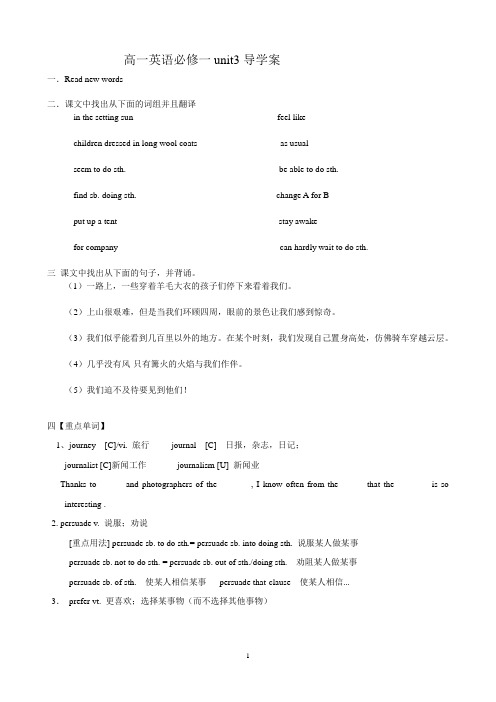
高一英语必修一unit3导学案一.Read new words二.课文中找出从下面的词组并且翻译in the setting sun feel likechildren dressed in long wool coats as usualseem to do sth. be able to do sth.find sb. doing sth. change A for Bput up a tent stay awakefor company can hardly wait to do sth.三课文中找出从下面的句子,并背诵。
(1)一路上,一些穿着羊毛大衣的孩子们停下来看着我们。
(2)上山很艰难,但是当我们环顾四周,眼前的景色让我们感到惊奇。
(3)我们似乎能看到几百里以外的地方。
在某个时刻,我们发现自己置身高处,仿佛骑车穿越云层。
(4)几乎没有风-只有篝火的火焰与我们作伴。
(5)我们迫不及待要见到他们!四【重点单词】1、journey [C]/vi. 旅行journal [C] 日报,杂志,日记;journalist [C]新闻工作journalism [U] 新闻业Thanks to______ and photographers of the _______, I know often from the _____ that the _______ is so interesting .2. persuade v. 说服;劝说[重点用法] persuade sb. to do sth.= persuade sb. into doing sth. 说服某人做某事persuade sb. not to do sth. = persuade sb. out of sth./doing sth. 劝阻某人做某事persuade sb. of sth. 使某人相信某事persuade that-clause 使某人相信...3.prefer vt. 更喜欢;选择某事物(而不选择其他事物)[①Ii prefer playing in defence .我喜欢打防守。
2023年新人教版高中英语必修一《Unit3SportsandFitness》单元教案(附导学案)

《Unit 3 Sports and Fitness》单元教案Unit 3 Sports and FitnessPeriod 1 Listening and Speaking & Listening and Talking【教材分析】In this period, the theme is “sports and health”. Students will have a general understanding of how to invite a friend to a sports event and voice one’s own opinions about sportsmanship by listening and ultimately can form a healthy lifestyle and good attitudes towards sports.Listening and Speaking introduces the topic of sports events with posters advertising them, along with related vocabulary and grammar, and is a warm-up for the activities which follows.Listening and Talking introduces idea of sportsmanship by listening to a conversation, matching speakers’ opinions and giving and discussing one’s own opinions.【教学目标与核心素养】1.Instruct students to get main facts by listening and motivate them to talk about the topics about how to invite a friend to a sports event ,voice one’s own opinions about sportsmanship by listening.2.Develop students’sense of cooperative learning and individual thinking capability.3.Develop students’different listening skills to solve different listening comprehensive problems.【教学重难点】1.Teach students how to focus on key words, not on single words or grammar.2.Prompt Ss to talk about the related topics, such as how to invite a friend to a sports event and voice one’s own opinions about sportsmanship.【教学过程】Part 1: Listening and SpeakingLead inThe teacher is advised to talk with their students about sports events.Boys and girls, look at the posters on p36, what sports events do you like to watch? Which sports would you like to try? After their small talk, the teacher can move on by finishing the following listening task:Play conversation 1 which is about Shen Qi’s main purpose for talking to Amy and after finishing listening for the first time, the students need to solve the following tasks.1.Purpose2.Listen to conversation 1 again and write down the words that the speaker stresses:Listening tip:Listen for main ideas.Try to catch the main ideas instead of trying to remember and translate each word you hear.After finishing the task above, the teacher is expected to play conversation 2 which is about Adam’s inviting Julie to a sports event and after finishing listening, the students need to solve the following task.Listen to Conversation 2. Then answer the following questions:1.When will the event happen?The event will happen2.What”s a “Blue Paint“ run?A “Blue Paint“ run is a fun run that3.Why is it called a “Blue Paint“ run?Because people can buy water ballons flled with and the runners.4.If 200 people take part in the run and 400 balloons are sold, how much money will they collect?Finally, after finishing the task above, the teacher is expected to instruct students to work in groups to finish the following project:Speaking ProjectWhat event or activity would you like to invite your friend to? Make a conversation with a partner.Ski Race: Zhangjiakou, a beautiful city in northern China, will host the Youth Ski Race in December.Track Meet: a great event for track –and –field lovers on 26 October.Gym Class: come and work out at a gym! You can make it.Part 2: Listening and Talking:The teacher is advised to talk with their new students about the related topic:Boys and girls , what do you think of sportsmanship? Let’s listen and find out: Play the listening and match each opinion with the right speaker. Who do you agree with? Why?Cao Jing Lily MaxA.An athlete should do his/her best to win.B.The girl should stop and help the other girl. Good sportsmanship is more important than wining!C.An athlete should think about honor and his/her fans if he/she is competing for his/her country.Listen again and circle the expressions that you hear in the conversation.agreeingI agree.So do I. Exactly!All right Good idea. Yes, I think so. disagreeingI”m sorry, but I disagree/don”t agree. I don”t think so. That”s not right.That doesn”t make any sense! That”s not how I see it.I see what you mean, but …Me too.Sure./Certainly./Of course. You”re right/correct.I guess so.Talking projectWork in groups. Choose one of the situations below and make a conversation:●A soccer player should not pretend to fall down even if it helps his/her team.●In school teams, everyone should get a chance to play, not only the best players.●It is wrong to pay people millions of yuan to play sports.●Athletes should play only for their own country.EXAMPLEA: I agree with the idea that a soccer player should never pretend to fall down even if it helps his or her team. You should never cheat.B: Exactly! It”s important to do the right thing.C: Well, don”t think so. Many players do it, and they think it helps their team to win. A: That doesn”t make any sense!B: I see what you mean, but the audience wants fair play.Unit 3 Sports and Fitness-Listening and Speaking & Listening and Talking【教材分析】This lesson focuses on the discourse analysis of its organization and features. Through the questions, the students are guided to sort out why Lang Ping and Jordan are masters and what role models they set. On this basis, the students are allowed to use the language they have learned to talk about the sports stars in their minds.【教学目标与核心素养】1.Read quickly to get basic information about Lang Ping and Jordan; read deeply to understand why they can be called sports legends.2.Understand the meaning of some languages in the context of the text through question guidance, such as “time seems to stand still, graceful“ and so on.3.Read and clarify the context of each part of the text, learning how to talk a write sports legends.4.Through comparativeanalysis,w e can form the criterif aor judgingthelegendary figures and learn to choose the legendary sports stars we like.【教学重难点】1.Get basic information about Lang Ping and Jordan; read deeply2.Understand why they can be called sports legends.3.Understand the meaning of some languages in the context of the text, such as “time seems to stand still, graceful“ and so on.【教学过程】Step 1 Leading-in1.Have the Ss ask and answer in pairs.Q1: Who are your favorite sports player?Q2: Do you like him/her? Why?2.Then ask the Ss to talk about Lang Ping and Michael Jordan, and have several Ss to share their ideas.Q1: What do you know about Lang Ping and Michael Jordan?Q2: What else do you want to know about them?Step 2Understanding the title and the lead paragraph.Have the Ss think about the title and answer the following questions.Q1: Why do you think the author chooses to write these two sports stars?Q2: What does “living legend” mean?Q3: What are the standards or requirements to be chosen as a living legend of sports star?Then discussthe questionsabove in groups,then have someone to sharetheir ideas.Step 3 Getting detailed information about Lang Ping1.Read to answer the following questions.Living legends Jordan Masters?Good examples?Q1: Is Lang Ping a master in her area? How do you know that?Q2: What good examples does Lang Ping set for others?2.Read again and Focus on the story about Lang Ping. Then try to retell the story of Lang Ping.Step 4 Exploring detailed information about Michael Jordan1.Read the paragraph of Michael Jordan and complete the following table.We have got to know why Lang Ping is a living legend. Now read and find out why Michael Jordan is a living legend on your own by completing the following table.2.Sort out detailed information about Michael Jordan.(1)Understand the transitional sentence.Q: Which part is about Michael Jordan as a master? Which part is about the example he set?(2)Have the Ss Focus on why Michael Jordan is a master and what good examples Michael Jordan set when they’re reading. And think about these questions as below:Q1: How does the author describe his impressive skills?Q2: How do you understand “time seemed to stand still”?Q3: What does “graceful” mean?Q4. Which sentence do you think best describes his mental strength?Q5. Which words is important in the sentence in describing his mental strength? Why?Q6: How do you understand “unique”?Q7: What can we learn from Michael Jordan?Step 5 Discussing and recommendingRecommend their own living legends of sports.Work in groups to choose your own living legend of sports and give the reasons of your choice.Step 6 HomeworkReview the stories of Lang Ping and Michael Jordan, and try to retell them.Unit 3 Sports and FitnessPeriod 3 Discovering Useful Structures—tag questions【教材分析】This teaching period mainly deals with the grammar: tag questions.This period carries a considerable significance to the cultivation of students’spoken English. The teacher is expected to enable students to master this period thoroughly and consolidate the knowledge by doing some exercise of good quality. 【教学目标与核心素养】1.Get students to have a good understanding of the basic usages of tag questions.2.Enable students to use the basic phrases structures flexibly.3.Develop students’ speaking and cooperating abilities.4.Strengthen students’ great interest in grammar learning.【教学重难点】1.How to enable students to have a good understanding of the basic usages of tag questions.2.How to enable students to use the basic usages of tag questions flexibly.【教学过程】Step1: 语法自主探究一、根本组成方法1. 确定式陈述You often play badminton, don’t you?你常常打羽毛球,是吗?局部+否认附加You are going to the gym with me, aren’t you?疑问局部〔前肯你要和我一起去健身房,是吗?她以前去过上海,是后否〕She’s been to shanghai before, hasn’t she?吗?2.否认式陈述It isn”t a beautiful flower, is it?那不是秀丽的花,是吗?局部+确定附加You didn”t go skating yesterday, did you? 你昨天没去滑冰,是疑问局部〔前否吗?后肯〕They can’t finish it by Friday, can they?他们不能在星期五之前完成,是吗?3.含有否认词〔1 〕当陈述句中含有He hardly goes to school by car, 的附加疑问句seldom, hardly, never, does he?rarely, little, few, none, 他几乎不开车去上学,是吗?neither ,no, not, nowhere, You have never been to Paris, havenothing no one, nobody 等you?否认意义的词时,后面的你从没去过巴黎,是吗?附加疑问句则为确定形They seldom come late, do they?式。
人教版英语必修一Unit 3(Period 1)教学设计
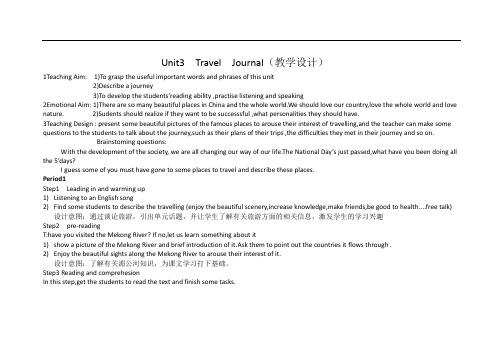
Unit3 Travel Journal(教学设计)1Teaching Aim: 1)To grasp the useful important words and phrases of this unit2)Describe a journey3)To develop the students’reading ability ,practise listening and speaking2Emotional Aim: 1)There are so many beautiful places in China and the whole world.We should love our country,love the whole world and love nature. 2)Sudents should realize if they want to be successsful ,what personalities they should have.3Teaching Design : present some beautiful pictures of the famous places to arouse their interest of travelling,and the teacher can make some questions to the students to talk about the journey,such as their plans of their trips ,the difficulties they met in their journey and so on.Brainstoming questions:With the development of the society, we are all changing our way of our life.The National Day’s just passed,what have you been doing all the 5’days?I guess some of you must have gone to some places to travel and describe these places.Period1Step1 Leading in and warming up1)Listening to an English song2)Find some students to describe the travelling (enjoy the beautiful scenery,increase knowledge,make friends,be good to health....free talk)设计意图:通过谈论旅游,引出单元话题,并让学生了解有关旅游方面的相关信息,激发学生的学习兴趣Step2 pre-readingT:have you visited the Mekong River? If no,let us learn something about it1)show a picture of the Mekong River and brief introduction of it.Ask them to point out the countries it flows through .2)Enjoy the beautiful sights along the Mekong River to arouse their interest of it.设计意图:了解有关湄公河知识,为课文学习打下基础。
Book1Unit3 导学案(教师版)
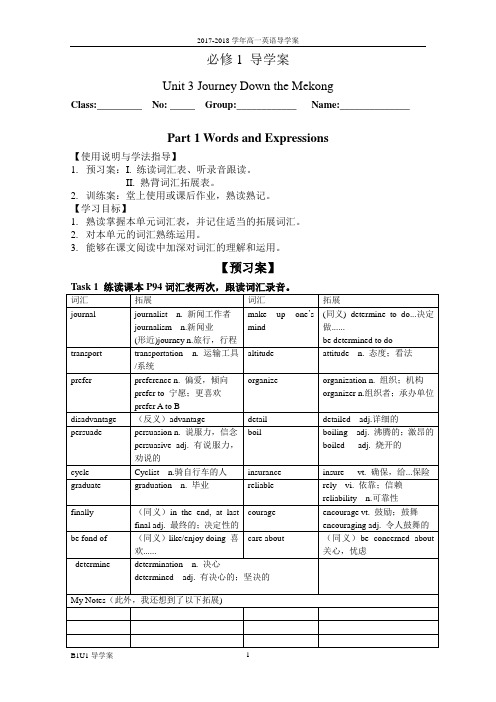
必修1 导学案Unit 3 Journey Down the MekongClass:_________ No: _____ Group:____________ Name:______________Part 1 Words and Expressions【使用说明与学法指导】1.预习案:I. 练读词汇表、听录音跟读。
II. 熟背词汇拓展表。
2.训练案:堂上使用或课后作业,熟读熟记。
【学习目标】1.熟读掌握本单元词汇表,并记住适当的拓展词汇。
2.对本单元的词汇熟练运用。
3.能够在课文阅读中加深对词汇的理解和运用。
【预习案】【训练案】一、单句填空:1.She chose Spain, but personally I'd prefer (更喜欢) to go to France.2.After graduating (毕业) from college, they finally got the chance to take a bike trip.3.Weather determines (决定) harvest.4.I wanted to pay the train fare (费用), but my friend insisted. Finally I gave in.5.I finally persuaded (说服) him to go out for a drink with me.6.Our school is going to organize (组织) a concert next month.7.It took three days to transport(运输,运送) the food, clothes and medicine to the disaster-hit area.8.When the guests arrived, the little boy had such a bad attitude (态度) that his mother was angry with him.9.I heard the news report, but I’m still not sure if the information was reliable (可靠的) or not.10.We finally (最后;终于) arrived in Rome.11.What does the radio weather forecast (预测;预报) say?12.It's about half an hour's journey (旅行;旅程).13.He works in an insurance (保险) company.14.But details(细节) of both plans have yet to be announced.15.I did this daily because my schedule (时间表) on the wall told me to do this to be successful.16.China has many advantages. But it also has some disadvantages(不利条件).17.The dolphins disappeared beneath(在……下面) the waves.18.We can and must overcome our shortcomings(缺点).19.We stayed there until midnight(午夜).20.The top one-third of all high school graduates (大学毕业生) are entitled to(有权,有……的资格) an education at California State University.5. How I wish I could make a journey into space and see the starts up close. And finallyI could set down the travel journal. (journal/journey)6. The results of the survey have been encouraging, and I find that I have the courage to go on. (courage)7. A determined person will never give up if he determines to do something successfully. (determine)8. He is fond of having (have) a hand in everything.9. Many children prefer to tell (tell) their trouble to friends.Part 2 Language Points in Reading 1【使用说明与学法指导】1.预习部分:I. 精读课文,互译文中的词汇、句型及语法结构。
人教版 高中英语 必修一unit3 003 导学案(教师版)
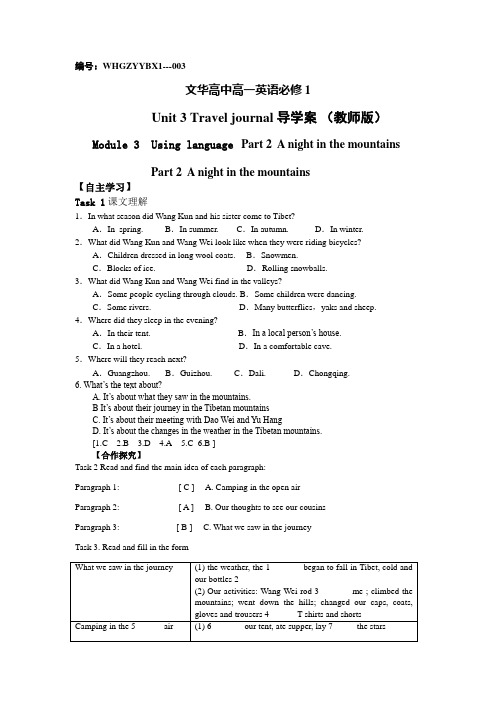
编号:WHGZYYBX1---003文华高中高一英语必修1Unit 3 Travel journal 导学案(教师版)Module 3 Using language Part 2 A night in the mountainsPart 2 A night in the mountains【自主学习】Task 1课文理解1.In what season did Wang Kun and his sister come to Tibet?A.In spring. B.In summer. C.In autumn. D.In winter. 2.What did Wang Kun and Wang Wei look like when they were riding bicycles?A.Children dressed in long wool coats. B.Snowmen.C.Blocks of ice. D.Rolling snowballs.3.What did Wang Kun and Wang Wei find in the valleys?A.Some people cycling through clouds. B.Some children were dancing.C.Some rivers. D.Many butterflies,yaks and sheep. 4.Where did they sleep in the evening?A.In their tent. B.In a local person’s house.C.In a hotel. D.In a comfortable cave.5.Where will they reach next?A.Guangzhou. B.Guizhou. C.Dali. D.Chongqing.6. What’s the text about?A. It’s about what they saw in the mountains.B It’s about their journey in the Tibetan mountainsC. It’s about their meeting with Dao Wei and Yu HangD. It’s about the changes in the weather in the Tibetan mountains.[1.C 2.B 3.D 4.A 5.C 6.B ]【合作探究】Task 2 Read and find the main idea of each paragraph:Paragraph 1:_____________ [ C ] A. Camping in the open airParagraph 2:_____________ [ A ] B. Our thoughts to see our cousinsParagraph 3:_____________[ B ] C. What we saw in the journeyTask 3. Read and fill in the form6.put up7. beneath8. stayed9. where 10. hardly]Task 4能力提升 --- 阅读理解People who like travelling have their reasons. They believe that travelling can help them expand their field of view,especially in the geographical and historical sense. They also think that touring will give them more chances to enjoy different kinds of food and experience new things that would never be brought by other activities. But those who dislike travelling also have some reasons.Travelling,in my opinion,does more good than harm. Most importantly,it broadens(使扩大) our mind. We can get in touch with other civilizations(文明),cultures,customs and ideas.Through history,most people travelled because of necessity—not for pleasure. People travelled just in order to remain alive. They searched for food to eat or places to live in. They sometimes ran away from enemies. This is not to say that no one ever travelled just for the fun of it. In ancient times,for example,rich Romans travelled all the way to Greece to take part in the Olympic Games,and festivals.Of course,some people decided to travel just out of curiosity(好奇心).They wanted to find out what it looked like beyond the horizon(地平线).Also business travel has been going on for centuries. Traders could not only make money but also learn to speak several languages and be introduced to different cultures.So,travelling does enrich our mind and draw new ideas to us. There is no doubt that we can get much from it.1.The underlined word “expand” in Paragraph 1 can be replaced by “________”.A.widen B.protect C.lose D.decide2.According to the passage,in the past most people travelled ________.A.for fun B.for knowledge C.to get experiences D.to make a living3.In the writer’s opinion,travelling can be ________.A.expensive B.funny C.helpful D.tiring4.What’s the main idea of this passage?A.Different kinds of travelling. B.Travelling enriches our mind.C.Ways to enjoy yourself while travelling.D.The advantages and disadvantages of travelling.[1.A2.D3.C4.B]【教学反思】。
人教课标版高中英语必修一 Unit3 Reading for information 导学案-新版
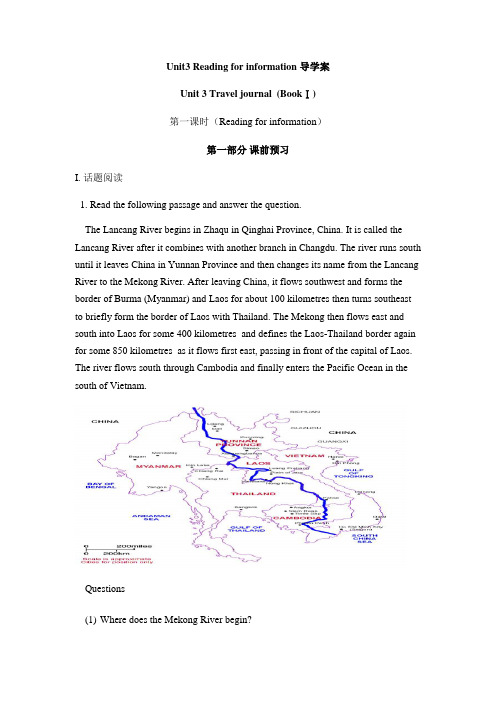
Unit3 Reading for information 导学案Unit 3 Travel journal (BookⅠ)第一课时(Reading for information)第一部分课前预习I. 话题阅读1. Read the following passage and answer the question.The Lancang River begins in Zhaqu in Qinghai Province, China. It is called the Lancang River after it combines with another branch in Changdu. The river runs south until it leaves China in Yunnan Province and then changes its name from the Lancang River to the Mekong River. After leaving China, it flows southwest and forms the border of Burma (Myanmar) and Laos for about 100 kilometres then turns southeast to briefly form the border of Laos with Thailand. The Mekong then flows east and south into Laos for some 400 kilometres and defines the Laos-Thailand border again for some 850 kilometres as it flows first east, passing in front of the capital of Laos. The river flows south through Cambodia and finally enters the Pacific Ocean in the south of Vietnam.Questions(1)Where does the Mekong River begin?________________________________________________________________ (2)As the longest river in Southeast Asia, how many countries does the MekongRiver flow through? What are they?________________________________________________________________ ________________________________________________________________ 2.Collect information about the great rivers in China and the world, especially the Mekong River.II. 词汇学习1.Write out the words with the help of the information given.(1).diary n →___________ n. 日记→journalist n. 记者(2).cost n.→_________ n. 小费→_________ n. 费用(3).bike n.→_________ n. 自行车→_________ v.骑自行车(4).decide v →__________ v. 决定,确定→__________ adj. 坚决的(5).travel n →_________ n. 航行→trip n.旅行→__________ n. 旅行(6).night n →__________ n. 午夜→_________ n. 中午→noon n. 中午(7) . idea n.→__________ n. 观点,看法→__________ n. 观点,见解;风景(8) . bag n.→________________ n. 书包→__________ n. 小包,包裹(9). mistake n.→fault n. 错误→______________ n. 缺点(10).under prep.→below prep. 在……下方→________ prep. 在……下面第二部分课中互动Step I Lead-in and warming-up引入与激趣I. Talk about your trip in the National Day Holiday.1. Where did you go? How did you go?_______________________ _____________________2. How long did they stay there? How much did they spend?________________________ ________________________3. What did you take for your trip?_______________________________________________________________ II. Compare different kinds of transport and fill the form.I. Pre-reading1. Brainstorm the uses of a river for the people who live along it_____________________________________________________________________________________________________________________________________________________________________2. Match the great rivers in the world with the locations where the rivers lie.Names of river LocationMekong river FranceSeine(塞那河) ChinaNile(尼罗河) RussiaRhine(莱茵河) EnglandCongo(刚果河) EgyptAmazon(亚马逊河) GermanyMississippi(密西西比河) Central AfricaThames(泰唔士河) USVolga(伏尔加河) BrazilII. Reading1.Skim the passage to match the main idea with its paragraph.Para.1 Different attitudes between themPara.2 Their preparation and details about the Mekong RiverPara.3 Their dream2.Fill in the blanks and get the main idea of the text.____________ and his sister _____________ were planning to ____________ down the Mekong River after _______________ from college and they were making ______________ for the trip.3.Scan the text to fill in the form and find out what the plan is.4.Put the sentences about the Mekong River in the proper order.① The Mekong River enters the South China Sea.② The Mekong River begins at a glacier on a Tibetan mountain.③ At first, the Mekong River is small, and the water is clear and cold.④ The Mekong River enters Southeast Asia.⑤ The Mekong River travels across western Yunnan Province.⑥ The Mekong River leaves China.The proper order:______________________________________5. What were their preparations?①They bought ___________________;②They got their cousins _________________________③They found_____________________.Step III Text interpretation-文本解读I. Key words1. Can persuade in paragraph one be replaced with advise?Did Wang Kun buy a mountain bike?2. In the last sentence in paragraph one schedule means _______.A. 时刻表B.日程安排C.节目表D.明细表3. determined in paragraph two means _______.A. 坚定的B. 确定的4. In paragraph three, pace means the _________ at which a river flows.5. In paragraph three, bend is a ______ .A. nounB. verb6. The text introduces Ss to many geographical terms. They are source, ___________________________________________________________________.Ⅱ Further understanding -深层理解1. Read the article carefully and decide whether the following statements are true (T) or false (F).________( 1). Wang kun is a high school student.________( 2). Both Dao Wei and Yu Hang belong to the Han nationality and they grew up in eastern Yunnan province.________ (3). The source of Mekong is in Qinghai province.________ (4). Finally Wang Kun agreed with his sister to cycle with her.________ (5). They found few atlas and books about Mekong River in library.________( 6). Mekong river begins in a glacier on a Tibetan mountain. The water there is clear but not cold.________ (7). Only a small part of the river is in China.________ (8). Although it is not easy to travel along the Mekong River, Wang Wei insisted on doing so.2. Answer each question on Page 19 in SB.3. Make comparison of the attitudes of Wang Kun and Wang Wei and make lists of their similar and different attitudes about the trip.Ⅲ. Difficult sentence structuresTranslate the following sentences from the text and paraphrase them.1. Although she didn’t know the best way of getting to places, she insisted thatshe organize the trip properly.________________________________________________________________ ________________________________________________________________2. She gave me a determined look—the kind that said that she would not changeher mind._________________________________________________________________ _________________________________________________________________3. … my si ster does not care about details.__________________________________________________________________4. It makes wide bends or meanders through low valleys to the plains where ricegrows.__________________________________________________________________ __________________________________________________________________ Ⅳ.Emotion & culture1.Why do we always call the river we live along Mother River?(1)________________________________________________________________(2) ________________________________________________________________(3) ________________________________________________________________ 2. Have a discussion:(1). What should we do for our Mother River in face of river pollution?__________________________________________________________________ ___________________________________________________________________ (2). What suggestions will we make for the government?___________________________________________________________________ ___________________________________________________________________3. Debate “Which character do you like, Wang Kun’s or Wang Wei’s? Why? ”4. Make a comparison.Step IV Talking and sharing -讨论与分享(含自我总结与评价)1. Suppose you can have a chance to travel, following the route of only one of the great rivers in the world with your group members. First have a discussion and make a travel plan , then share your plan with the whole class.Which one of the great rivers will you choose?How are you travelling?What will you do before you start?2. What have you learnt in this passage?3. What do you still have problem with?第三部分课后巩固I.缩写改写与复述1. Fill in the blanks.Wang Kun and his sister had ①.________ about taking a great bike trip ever ②.________ middle school. After ③.________ from college,they ④.________ got the chance to make their dream come true. His sister thought of the idea to ⑤.________ along the Mekong River. They both bought expensive bikes. They also got their cousins ⑥.________ in cycling. Wang Wei ⑦.________ that they should find the source and begin their journey there When she heard that the ⑧.________ of the Mekong River is in Qinghai Province,she wouldn’t ⑨.________ her mind. She even felt excited when she knew that their journey would begin at an ⑩.________ of more than 5,000 metres. Before the trip they found a large atlas in the library. From the atlas they knew clearly about the Mekong River.2. Retell the text with the words and expressions given below.dream about, ever since, graduate from, made up one’s mind, cycle, stubborn, determined, change one’s mind, journey, altitude, insistⅡ. 熟读与词汇探究1.Read the reading passage again and find out the meaning of the words and expressions in bold, trying to guess the meaning from the context.2. Complete the table using the geographical terms.The Mekong RiverIII.类文阅读1.Rivers are one of our most important natural resources. Many of the world’sgreat cities are located on rivers, and almost every country has at least oneriver flowing through it that plays an important part in the lives of its people.Since the beginning of history, people have used rivers for transportation.The longest one in the United States is the Mississippi. The lifeline of Egypt is the Nile. To the people of India , the Ganges is great, but it is also importantfor transportation; ships can travel along it for a thousand miles. Other greatrivers are the Congo in Africa and the Mekong in southeast Asia, The greatestof all for navigation(航海), however, is the Amazon in Brail, It is so wide and so deep that large ships can go about two thousand miles upon it.Besides transportation, rivers give food, water to drink, water for crops, and chances for fun and recreation for the people who live along their banks.In order to increase the supply of water for crops, engineers sometimes build a dam across a river and let a lake form behind the dam. Then people can use the water not only to irrigate their fields but also to make electricity for their homes and industries.However, large cities and industries that are located upon rivers often make problems. As the cities grow in size and industries increase in number, the water in the rivers becomes polluted with chemicals and other materials.People are learning the importance, however, of doing more to keep theirrivers clean if they want to enjoy the benefits of this natural resource.2.Search for more information about the Mother River in different countries andcompare them in at least 3 parts, finding out what they have in common and the differences between them.Suggested answers:参考答案:课前预习I. 话题阅读1.(1) It begins in Zhaqu in Qinghai Province, China.(2)6 contries. They are China, Laos, Myanmar, Thailand, Cambodia, and Vietnam.II. 词汇学习1. journal; tip; fare; bicycle; cycle; determine; determined; voyage; journey; midnight; midday; opinion; view; schoolbag; parcel; shortcoming; beneath课中互动阅读训练I. Pre-reading2. Match the great rivers in the world with the locations where the rivers lie.Names of river LocationMekong river FranceSeine(塞那河Nile(尼罗河) RussiaRhine(莱茵河) EnglandCongo(刚果河) EgyptAmazon(亚马逊河) GermanyMississippi(密西西比河) Central AfricaThames(泰唔士河) USVolga(伏尔加河) BrazilII. Reading1.Skim the passage to match the main idea with its paragraph.Para.1 Different attitudes between themPara.2 Their preparation and details about the Mekong RiverPara.3 Their dream2.Wang Kun; Wang Wei; take a bike trip; graduating; preparations .3.Scan the text to fill in the form and find out what the plan is.Step III Text interpretation-文本解读Ⅱ. 1.F F T T F F F T3.1.(1)Rivers have been one of our most important natural resources from ancient times on;(2) Its basin is always the center of politics, economy and culture;(3) It plays an irreplaceable role in the development of society.(4)Rivers have been used for transportation.…4.课后巩固Ⅰ 1.①. dreamed ②. since ③. graduating/graduation ④. finally ⑤. cycle⑥. interested⑦. insisted ⑧. source ⑨.change⑩. altitudeⅡ 2. The Mekong River。
人教版高一英语必修一unit3学案
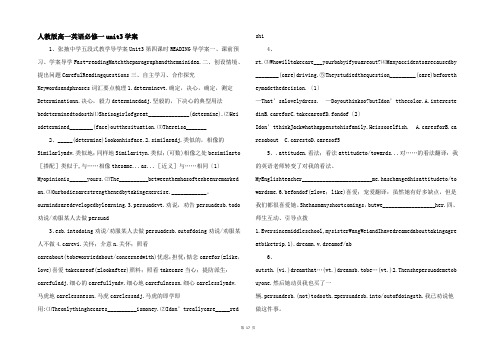
人教版高一英语必修一unit3学案1、张掖中学五段式教学导学案Unit3第四课时READING导学案一、课前预习、学案导学Fast-readingMatchtheparagraphandthemainidea.二、创设情境、提出问题CarefulReadingquestions三、自主学习、合作探究Keywordsandphrases词汇要点梳理1.determinevt.确定,决心,确定,测定Determinationn.决心,毅力determinedadj.坚毅的,下决心的典型用法bedeterminedtodosth⑴Sheisagirlofgreat______________(determine).⑵Hei sdetermined________(face)outthesituation.⑶Thereisa_______2、_____(determine)lookonhisface.2.similaradj.类似的,相像的Similarlyadv.类似地;同样地Similarityn.类似;(可数)相像之处besimilarto [搭配]类似于,与……相像thesame...as...[近义]与……相同〔1〕Myop inionis______yours.⑵The__________betweenthemhasoftenbeenremarked on.⑶Ourbodiesarestrengthenedbytakingexercise.____________,ourmindsaredevelopedbylearning.3.persuadevt.劝说,劝告persuadesb.todo 劝说/劝服某人去做persuad3、esb.intodoing劝说/劝服某人去做persuadesb.outofdoing劝说/劝服某人不做4.carevi.关怀;介意n.关怀;照看careabout(tobeworriedabout/concernedwith)忧虑;担忧;惦念carefor(=like,love)喜爱takecareof(=lookafter)照料;照看takecare当心;提防派生:carefuladj.细心的carefullyadv.细心地carefulnessn.细心carelesslyadv.马虎地carelessnessn.马虎carelessadj.马虎的即学即用:⑴Theonlythinghecares__________ismoney.⑵Idon’treallycare_____red shi4、rt.⑶Whowilltakecare___yourbabyifyouareout?⑷Manyaccidentsarecausedby ________(care)driving.⑤Theystudiedthequestion_________(care)beforeth eymadethedecision.〔1〕—That’salovelydress.—Doyouthinkso?butIdon’t thecolor.A.intereste dinB.careforC.takecareofD.fondof〔2〕Idon’tthinkJackwhathappenstohisfamily.Heissoselfish. A.caresforB.ca resabout C.carestoD.caresof55、.attituden.看法;看法attitudeto/towards...对……的看法翻译:我的英语老师转变了对我的看法。
人教新教材必修一unit3知识点讲解与练习导学案
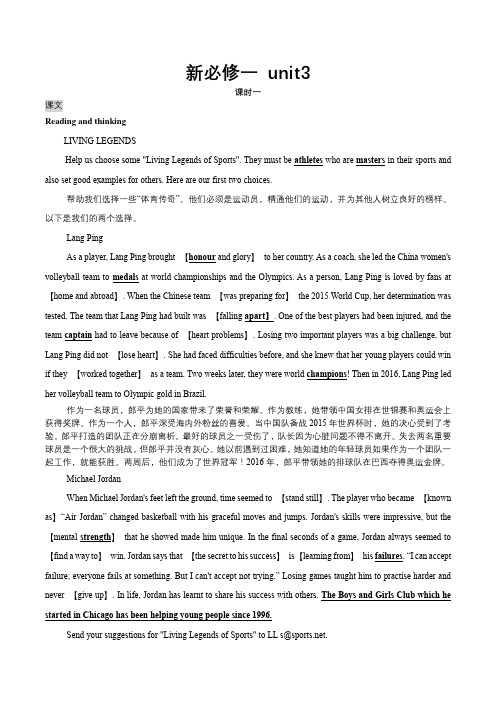
新必修一unit3课时一课文Reading and thinkingLIVING LEGENDSHelp us choose some "Living Legends of Sports". They must be athletes who are masters in their sports and also set good examples for others. Here are our first two choices.帮助我们选择一些“体育传奇”。
他们必须是运动员,精通他们的运动,并为其他人树立良好的榜样。
以下是我们的两个选择。
Lang PingAs a player, Lang Ping brought 【honour and glory】to her country. As a coach, she led the China women's volleyball team to medals at world championships and the Olympics. As a person, Lang Ping is loved by fans at 【home and abroad】. When the Chinese team 【was preparing for】the 2015 World Cup, her determination was tested. The team that Lang Ping had built was 【falling apart】. One of the best players had been injured, and the team captain had to leave because of 【heart problems】. Losing two important players was a big challenge, but Lang Ping did not 【lose heart】. She had faced difficulties before, and she knew that her young players could win if they 【worked together】as a team. Two weeks later, they were world champions! Then in 2016, Lang Ping led her volleyball team to Olympic gold in Brazil.作为一名球员,郎平为她的国家带来了荣誉和荣耀。
人教新课标高中英语必修一Unit3Traveljournal导学案(1)

第三单元Reading导学案I . Warming up1. Do you like travelling?2. Where have you been? Can you introduce the place? Or where doyou want to go? Why?about ____________________ .(2) Where and HowThey have the idea to _______________ the Mekong River from _______ it _______ to _______ i t _______ .IV . Detailed readingII . Pre-reading1. What coun tries does the Mekong River flow through?China ----- ►—►—一2. __________________________________________________ T he Chin ese part of the Mekong river is called __________________ .皿.Fast-readi ng1. Match the main idea of each paragraphPara 1 Preparati on for their trip and details aboutMek ong RiverPara 2 Wang Kun and Wang Wei ' s dreamPara 3 Their attitudes towards the travel2. Fill in the blanks according to the passage.(1)Who and WhatWang Kun and _________ ________ Wang Wei are dreamingPara 2. Differe nt opinionsCould you use some words or phrases to describe the characters格) of Wang Wei and Wang Kun?In my opinion, Wang Wei is a ______________ girl.As far as I ' m concerned, Wang Kun is a ___________ boy, the reason is that ________________________ .Paragraph 3What can they see duri ng the jour ney along the Mekong river?It beg ins in a ______ o n a _______ in Qin ghai Provi nee.Then, it _______ q uickly. It becomes ________ as it passesthrough deep ________ .Sometimes, the river becomes ___________ a nd en ters ______ After it leaves Chin a, it en ters ______________ and pacesslowly through___________ to ________ .At last, the river _______ en ters the South Chi na Sea.V . Free Talk (group work)1. Before travelling, what should we prepare?Some proverb about travelli ng 1. All roads lead to Rome .条条大路通罗马.2. Travel broade ns the mind.旅游开阔眼界.3. Read ten thousa nd books, travel ten thousa nd miles.读万卷书,行万里路.4丄ife can be likened to a journey with an unknown destination.生命可以被比作一次不知目的地的旅行。
人教版 高中英语 必修一unit3 001 导学案(教师版 学生版)
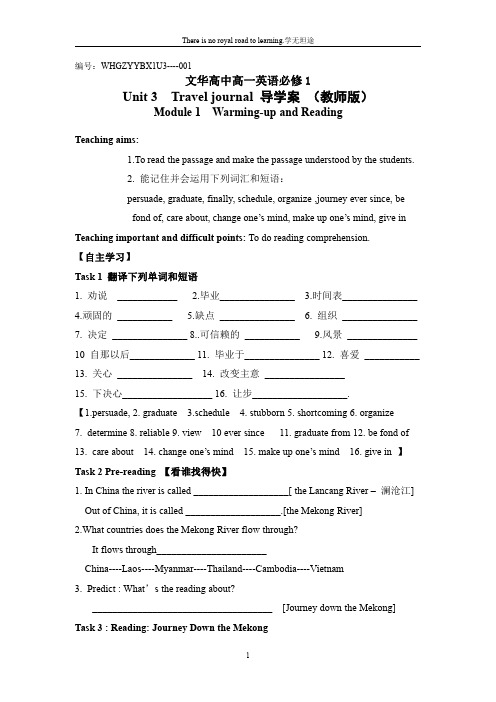
编号:WHGZYYBX1U3----001文华高中高一英语必修1Unit3Travel journal导学案(教师版)Module1Warming-up and ReadingTeaching aims:1.To read the passage and make the passage understood by the students.2.能记住并会运用下列词汇和短语:persuade,graduate,finally,schedule,organize,journey ever since,befond of,care about,change one’s mind,make up one’s mind,give in Teaching important and difficult points:To do reading comprehension.【自主学习】Task1翻译下列单词和短语1.劝说____________2.毕业_______________3.时间表_______________4.顽固的___________5.缺点_______________6.组织_______________7.决定_______________8..可信赖的___________9.风景______________ 10自那以后_____________11.毕业于_______________12.喜爱___________ 13.关心_______________14.改变主意________________15.下决心__________________16.让步___________________.【1.persuade,2.graduate 3.schedule anize7.determine8.reliable9.view10ever since11.graduate from12.be fond of 13.care about14.change one’s mind15.make up one’s mind16.give in】Task2Pre-reading【看谁找得快】1.In China the river is called___________________[the Lancang River–澜沧江] Out of China,it is called___________________.[the Mekong River]2.What countries does the Mekong River flow through?It flows through______________________China----Laos----Myanmar----Thailand----Cambodia----Vietnam3.Predict:What’s the reading about?____________________________________[Journey down the Mekong] Task3:Reading:Journey Down the MekongPart1:The dream and the planSkimming:1.Decide which is the main idea of the passage?A.The author and his sister’s plan about their winter holiday.B.The experience during the author and his sister’s trip in Qinghai.C.The author and his sister’s plan and preparations for their trip.D.anecdotes(轶事)that happened during their trip.[C]2.Read and find the main idea of each paragraph:Paragraph1:_____________[B] A.PreparationParagraph2:_____________[C]B.DreamParagraph3:_____________[A]C.A stubborn sister【合作探究】Task1Careful Reading【试一试】Read Paragraph1quickly and answer the following questions1.Who are Wang Kun and Wang Wei?They are___________and________,and both are_________________.2.What‘s their dream?Their dream was to___________________3.Who are Dao Wei and Yu Hang?They are Wang Kun’s____________who are at a__________in Kunming.答案1:They are brother and sister,and both are college students.2.Their dream was to take a great bike trip.3.They are Wang Kun’s cousins who are at a college in Kunming.Task2:Paragraph2:A stubborn sisterQ1:Did Wang Wei give Wang Kun a determined look when Wang Kun told her that the source of the Mekong is in Qinghai?_________[Yes] Q2:Is Wang Wei a stubborn girl?Why?Yes.She insisted that she______________the trip properly.Once shehas________________,nothing can change it.[(should)organize,made up her mind]Task3:Paragraph3:PreparationQ1:What can they see along the Mekong?They can see_____________________________________________[glacier,waterfall,plain,valley,rapids,delta]2.The Mekong begins in a_____________on a_____________________.[glacier,mountain in Qinghai Province]3.At first,the river is small.Then it becomes________as it passed throughdeep_________,travelling across___________________Province.Sometimes the river becomes a__________and enters______________.[rapids,valleys,western Yunnan,waterfall,wide valleys]4..It makes wide________or meanders through__________________tothe__________where rice grows.[bends,low valleys,plains]5.At last the river delta enters_________________.[the South China Sea] Task4当堂检测 1.课文理解1.Who had the idea of travelling by bike first?[D}A.Dao Wei.B.Yu Hang.C.Wang Kun.D.Wang Wei. 2.If they travel along the river,where will it become rapids as it passes through deep valleys?[C]A.In Qinghai Province.B.In Tibet.C.In Yunnan Province.D.In Vietnam. 3.If you travel with them,you will see all the following EXCEPT________.A.a desert B.a waterfall C.a delta D.a glacier[A] 4.What does Wang Kun think of his sister?A.Foolish and stubborn.B.Foolish but determined.C.Stubborn but determined.D.Unkind and stubborn.[C]5.What did they do before the trip?A.They had a very good rest.B.They talked with their parents about it.C.They were full of fear.D.They had prepared well for it.[D]6.Which is the proper order about the Mekong River according to the text?a.The Mekong River enters the South China Sea.b.The Mekong River begins in a glacier on a Tibetan mountain.c.At first,the river is small and the water is clear and cold.d.The Mekong River enters Southeast Asia.e.The Mekong River travels across western Yunnan Province.f.The Mekong River leaves China.A.b,c,e,f,a,d B.b,c,e,f,d,aC.c,b,e,f,d,a D.c,b,f,e,a,d[B]Ⅱ.课文缩写Wang Wei and I have1_______________taking a great bike trip.She2________ me to buy an expensive mountain bike,and she soon got our two cousins interested in cycling too.After3___________from college,we finally got the chance to take the trip.It was my sister4___________first had the idea to cycle along the entire Mekong River from where it begins to where it ends.My sister is a5_____________girl.Although she didn't know the best way,she 6_____________on7____________the trip properly.Once she has8_____ _____________________,nothing can change it.Finally I had to9_________to her. Several months before our trip,we went to the library and found a large atlas with good maps showing10____________of world geography.From it we got much more information about the Mekong River.We were both surprised to learn that half of the river is in China.答案 1.dreamed about 2.persuaded 3.graduating4.who 5.stubborn 6.insistedanizing8.made up her mind9.give in10.Details【学情反馈】【教学反思】编号:WHGZYYBX1U3----001文华高中高一英语必修1Unit3Travel journal导学案Module1Warming-up and Reading班级:_________组名:_________姓名:__________学习目标;1.To read the passage and make the passage understood by the students.2.能会运用下列词汇和短语:persuade,graduate,finally,schedule,organize,journey,ever since,be fond of,care about,change one’s mind,make up one’s mind,give in学习重点:To do reading comprehension.学习难点:To analyze some difficult sentences【自主学习】Task1翻译下列单词和短语1.劝说____________2.毕业_______________3.时间表_______________4.顽固的___________5.缺点_______________6.组织_______________7.决定_______________8..可信赖的___________9.风景______________10自那以后_____________11.毕业于_______________12.喜爱_________14.关心_______________14.改变主意________________15.下决心____________________16.让步________________.Task2Pre-reading【看谁找得快】1.In China the river is called_______________________Out of China,it is called___________________.2.What countries does the Mekong River flow through?It flows through______________________________________________ 3.Predict:What’s the reading about?It’s about__________________________________________Task3:Reading:Journey Down the MekongPart1:The dream and the plan1.Skimming:Decide which is the main idea of the passageA.The author and his sister’s plan about their winter holiday.B.The experience during the author and his sister’s trip in Qinghai.C.The author and his sister’s plan and preparations for their trip.D.anecdotes(轶事)that happened during their trip.2.Read and find the main idea of each paragraph:Paragraph1:_____________ A.PreparationParagraph2:_____________B.DreamParagraph3:_____________C.A stubborn sister【合作探究】Task1Careful Reading【试一试】Read Paragraph1quickly and answer the following questions1.Who are Wang Kun and Wang Wei?They are___________and________,and both are_________________.2.What‘s their dream?Their dream was to___________________3.Who are Dao Wei and Yu Hang?They are Wang Kun’s____________who are at a__________in Kunming.Task2:Paragraph2:A stubborn sisterQ1:Did Wang Wei give Wang Kun a determined look when Wang Kun told her that the source of the Mekong is in Qinghai?_________ Q2:Is Wang Wei a stubborn girl?Why?Yes.She insisted that she______________the trip properly.Onceshe has________________,nothing can change it.Task3:Paragraph3:Preparation1.Q1:What can they see along the Mekong?_____________________________________________2.The Mekong begins in a_____________on a_____________________.3.At first,the river is small.Then it becomes________as it passed throughdeep_________,travelling across___________________Province.Sometimes the river becomes a__________and enters______________.4.It makes wide________or meanders through__________________to the__________where rice grows.5.At last the river delta enters_________________.Task4当堂检测 1.课文理解1.Who had the idea of travelling by bike first?A.Dao Wei.B.Yu Hang.C.Wang Kun.D.Wang Wei.2.If they travel along the river,where will it become rapids as it passes through deep valleys?A.In Qinghai Province.B.In Tibet.C.In Yunnan Province.D.In Vietnam.3.If you travel with them,you will see all the following EXCEPT________.A.a desert B.a waterfall C.a delta D.a glacier4.What does Wang Kun think of his sister?A.Foolish and stubborn.B.Foolish but determined.C.Stubborn but determined.D.Unkind and stubborn.5.What did they do before the trip?A.They had a very good rest.B.They talked with their parents about it.C.They were full of fear.D.They had prepared well for it. 6.Which is the proper order about the Mekong River according to the text?a.The Mekong River enters the South China Sea.b.The Mekong River begins in a glacier on a Tibetan mountain.c.At first,the river is small and the water is clear and cold.d.The Mekong River enters Southeast Asia.e.The Mekong River travels across western Yunnan Province.f.The Mekong River leaves China.A.b,c,e,f,a,d B.b,c,e,f,d,aC.c,b,e,f,d,a D.c,b,f,e,a,dⅡ.课文缩写Wang Wei and I have1_________________taking a great bike trip.She 2__________me to buy an expensive mountain bike,and she soon got our two cousins interested in cycling too.After3___________from college,we finally got the chance to take the trip.It was my sister4_________first had the idea to cycle along the entire Mekong River from where it begins to where it ends.My sister is a5__________girl.Although she didn't know the best way,she 6____________on7____________the trip properly.Once she has8_____________ ____________,nothing can change it.Finally I had to9___________to her.Several months before our trip,we went to the library and found a large atlas with good maps showing10___________of world geography.From it we got much more information about the Mekong River.We were both surprised to learn that half of the river is in China.【学情反馈】【教学反思】。
人教版高中英语必修一Unit3 Consolidation and Revision 名师导学案
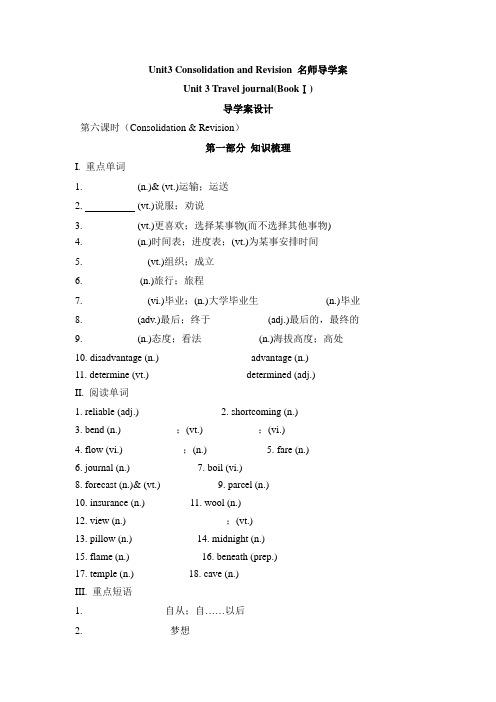
Unit3 Consolidation and Revision 名师导学案Unit 3 Travel journal(BookⅠ)导学案设计第六课时(Consolidation & Revision)第一部分知识梳理I. 重点单词1. __________ (n.)& (vt.)运输;运送2. __________ (vt.)说服;劝说3. __________ (vt.)更喜欢;选择某事物(而不选择其他事物)4. __________ (n.)时间表;进度表;(vt.)为某事安排时间5. ____________ (vt.)组织;成立6. ___________(n.)旅行;旅程7. ____________ (vi.)毕业;(n.)大学毕业生_____________ (n.)毕业8. __________ (adv.)最后;终于__________ (adj.)最后的,最终的9. __________ (n.)态度;看法___________ (n.)海拔高度;高处10. disadvantage (n.)__________________ advantage (n.)___________________11. determine (vt.)___________________ determined (adj.)_________________ II. 阅读单词1. reliable (adj.)________________2. shortcoming (n.) __________3. bend (n.)___________;(vt.)___________;(vi.)___________4. flow (vi.)____________;(n.)____________5. fare (n.)_________6. journal (n.)_____________7. boil (vi.)______________8. forecast (n.)& (vt.)___________ 9. parcel (n.)____________10. insurance (n.)_________11. wool (n.)___________12. view (n.)____________________;(vt.)________________13. pillow (n.)_____________14. midnight (n.)___________15. flame (n.)______________ 16. beneath (prep.)___________17. temple (n.)___________18. cave (n.)_____________III. 重点短语1. ________________自从;自……以后2. _________________梦想3. _____________________说服某人做某事4. _________________喜欢,喜爱5. _______________关心;忧虑;惦念6. _____________________改变主意7. ____________________下决心,决定8. __________屈服,让步;投降9. ________________ 照常10. _______________ 在午夜IV. 经典句式1. Ever since middle school,my sister Wang Wei and I ____________________ taking a great bike trip.从高中起,我姐姐王薇和我就一直梦想做一次伟大的自行车旅行。
人教版必修一第三单元导学案
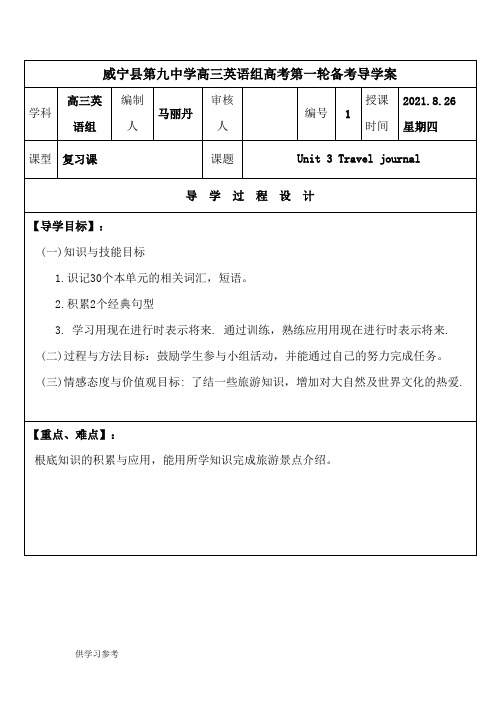
【导学练过程】:I.根底知识课前自查一.单词巧记1.____________(n.)运送;运输(vt.)运输;运送2.____________(n.)不利条件;不便之处→____________(反义词)优点,有利条件3.____________(vt.)说服;劝说4.____________(vi.)毕业(n.)大学毕业生→____________(n.)毕业5.____________(adv.)最后;终于→____________(adj.)最终的;最后的6.____________(adj.)喜爱的;慈祥的;宠爱的7.____________(adj.)顽固的;固执的8.____________(vt.)组织;成立→____________(n.)组织;团体→____________(n.)组织者9.____________(vt.)决定;确定;下定决心→____________(adj.)坚决的;有决心的→____________(n.)决心,决定10.____________(vi.)缓慢而行;踱步(n.)一步;速度;步调11.____________(n.)弯;拐角(vt.)使弯曲(vi.)弯身;弯腰12.____________(n.)态度;看法二.短语英汉互译1.the fare for transport________ 2.ever since ________ 3.dream of/about ________ 4.persuade sb. to do sth.________ 5.after graduating from college ________6.change one’s mind ________ 7.care about ________ 8.make up one’s mind ________ 9.at an altitude of... ________ 10.give in ________ 11.be fond of ________12.相反,代替13.放弃;停止14.感觉像……15.穿着16.照常17.醒着18.举起,张贴,悬挂19.在午夜20.向某人问好三.句子英汉汉英互译1. A determined person always tries to finish the job,no matter how hard it is2.我们迫不及待地想要见到他们。
高中英语 Unit 1 Period Three导学设计 新人教版必修1

高中英语 Unit 1 Period Three导学设计新人教版必修1基础落实Ⅰ.将下列句子变为间接引语1.The history teacher said to them,“The Chinese Communist Party was founded on July 1st,1921.”→________________________________________________________________________ ________________________________________________________________________ 2.“Where are you going?” the father asked his son.→________________________________________________________________________ 3.“I haven’t heard from my parents these days,” said Mary.→________________________________________________________________________ ________________________________________________________________________ 4.“Did you visit Beijing two years ago?”he asked me.→________________________________________________________________________ 5.He said,“I’m not going to invite her to the party.”→________________________________________________________________________Ⅱ.把下列句子变为直接引语1.I told him that I had lost my money and that I would find it.→________________________________________________________________________ 2.The doctor asked him how he was feeling then.→________________________________________________________________________ 3.The woman asked the policeman if he could tell her how to get to the nearest restaurant.→________________________________________________________________________ ________________________________________________________________________ 4.The woman asked him why he had to sleep in the open air.→________________________________________________________________________ ________________________________________________________________________ 5.My friend asked me what I was doing at 9∶00 am the day before.→________________________________________________________________________ ________________________________________________________________________ 6.Lee said that he joined the League in 1959.→________________________________________________________________________Ⅲ.完成句子1.The geography teacher told the pupils that _________________________________________________ (光比声传播的快).2.Mother asked the youngest girl __________________________________________________(她的玩具车出什么问题了).3.Linda asked Amy _____________________________________________________________ (她能否告诉) her the general idea of the poem.4.She said that ________________________ (她将尽力) to finish reading the novel by the end of that week.5.My father asked me ___________________________________________________________ (我为何对……如此着迷) that bad TV programme.Ⅳ.单项填空1.In the bookshop,a reader asked the shopkeeper ________ Who Moved My Cheese was interesting.A.if B.howC.what D.that2.—I don’t know ________ Mr.Green will come to see us.—He will help us with our English.A.why B.whenC.how D.where3.I was told ________ Bill Gates was thirteen he began to play with computers.A.that how B.how thatC.when that D.that when4.—Could you tell me ________?I’m going to see him.—Sorry,I don’t know.A.where does Mr.Li liveB.where did Mr.Li liveC.where Mr.Li livesD.where Mr.Li lived5.Yesterday he told me that he had met his uncle ________.A.two years ago B.two years beforeC.before two years D.for two years6.He said,“Mother,the boy is very naughty.”→He ________ very naughty.A.said his mother that the boy wasB.said to his mother that the boy isC.told his mother that the boy wasD.spoke to his mother that the boy was 7.The students asked ________.A.when is the sports meeting going to be held B.when the sports meeting is going to be held C.if was the sports meeting going to be held D.if the sports meeting was going to be held 8.—Who called just now,Sam?—It’s Terry.She asked ________.A.when we will set outB.when would we set outC.when we would set outD.when will we set out9.He asked me ________.A.when would I come backB.why I hadn’t attended the meetingC.how much did I pay for the mobile phoneD.whom was I going to the cinema with 10.—What did Father ask Lily yesterday?—Father asked her ________.A.did she pass the examB.when did she pass the examC.whether she had passed the examD.how she has passed the exam11.Could you tell me ________?A.when will Tom come backB.when does Tom come backC.when Tom will come backD.when Tom comes back12.I was told that the singer ________in 1980.A.was born B.is bornC.had been born D.had born13.After the examination,my teacher told me that failure ________ the mother of success.A.was B.isC.be D.been14.“Have you seen the film?” he asked me.→He asked me ________.A.had I seen the filmB.have I seen the filmC.if I have seen the filmD.whether I had seen the film15.The child asked his mother ________ go out to play tennis.A.that he could B.if he couldC.if could he D.that could he能力提升Ⅰ.阅读填空__1__You don’t show your secret personality when you’re awake because you can control your behavior,but when you’re asleep,your sleeping position shows the real you.__2__The important position is the one that you go to sleep in.If you go to sleep on your back,you’re a very open person.You normally trust people and you are easily influenced by fashion or new ideas.You don’t like to upset people,so you never express your real feelings.__3__If you sleep on your stomach,you are a rather secretive person.You worry a lot and you’re always easily upset.You’re very stubborn(顽固),but you aren’t very ambitious(上进的,有野心的).__4__This means that you enjoy having a good time.If you sleep on your side,you have usually got a wellbalanced personality.__5__You’re usually careful.You ha ve a confident personality.You sometimes feel anxious,but you don’t often get depressed.You always say what you think even if it annoys people.A.You’re quite shy and you aren’t very confident.B.You know your strengths and weaknesses.C.Normally people seldom change their sleeping position.D.Everyone has got two personalities—the one that is shown to the world and theother that is secret and real.E.Maybe you don’t want to make friends with a person who sleeps curled up. F.You usually live for today not for tomorrow.G.In a normal night,of course,people frequently change their position.Ⅱ.短文改错There are advantage for students to work while studying at school.One of them was that they can earn money.In the most part,students working to earn money for their own use.Earning their own money allow them to spend on anything as if they please.They would have to ask their parents for money or for permission to do things by the money.Some students may also to save up for our college or future use.答案基础落实Ⅰ.1.The history teacher told them that the Chinese Communist Party was founded on July 1st,1921.2.The father asked his son where he was going.3.Mary said that she hadn’t heard from her parents those days. 4.He asked me if I had visited Beijing two years before. 5.He said that he was not going to invite her to the party. Ⅱ.1.I said to him ,“I have lost my money.I will find it.” 2.“How are you feeling now?” the doctor asked him.3.“Can you tell me how to get to the nearest restaurant?” the woman asked the policeman.4.The woman asked him ,“Why do you have to sleep in the open air?” 5.My friend asked me ,“What were you doing at 9∶00 am yesterday?” 6.Lee said ,“I joined the League in 1959.”Ⅲ.1.light travels faster than sound 2.what was the matter with her toy car 3.whether/if she could tell 4.she would try 5.why I was so crazy about Ⅳ.1.A 2.A 3.D 4.C 5.B 6.C 7.D 8.C 9.B 10.C 11.C 12.A 13.B 14.D 15.B 能力提升 Ⅰ.1~5 DGAFB Ⅱ.There are advantageadvantagesfor students to work while studying at school.One of themwas is that they can earn money.In For the most part ,students working workto earn money for their own use.Earning their own money allowallowsthem to spend on anything as if theyplease.They would ∧not have to ask their parents for money or for permission to dothings by with the money.Some students may also to save up for ourtheir college or futureuse.。
人教版高中英语必修一Unit3 Extensive reading 名师导学案
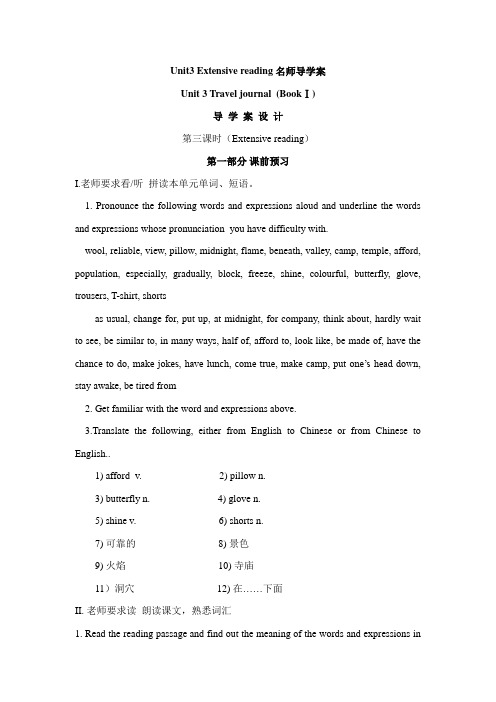
Unit3 Extensive reading 名师导学案Unit 3 Travel journal (BookⅠ)导学案设计第三课时(Extensive reading)第一部分课前预习I.老师要求看/听拼读本单元单词、短语。
1. Pronounce the following words and expressions aloud and underline the words and expressions whose pronunciation you have difficulty with.wool, reliable, view, pillow, midnight, flame, beneath, valley, camp, temple, afford, population, especially, gradually, block, freeze, shine, colourful, butterfly, glove, trousers, T-shirt, shortsas usual, change for, put up, at midnight, for company, think about, hardly wait to see, be similar to, in many ways, half of, afford to, look like, be made of, have the chance to do, make jokes, have lunch, come true, make camp, put one’s head down, stay awake, be tired from2. Get familiar with the word and expressions above.3.Translate the following, either from English to Chinese or from Chinese to English..1) afford v. ____________ 2) pillow n.______________3) butterfly n. ____________ 4) glove n. _______________5) shine v. ______________ 6) shorts n. ______________7) 可靠的 _______________ 8) 景色 ____________9) 火焰 _____________ 10) 寺庙 ___________11)洞穴 ___________ 12) 在……下面 ____________II. 老师要求读朗读课文,熟悉词汇1. Read the reading passage and find out the meaning of the words and expressions inbold, trying to guess the meaning from the context.2. Try to translate and analyze the following sentences.①our legs were so heavy and cold that they felt like blocks of ice.②In the late afternoon we found it was so cold that our water bottles froze.③In the valleys colourful butterflies flew around us and we saw many yaks and sheep eating green grass.④That’s what we looked like!⑤ To climb the mountains was hard work but as we looked around us, we were surprised by the view.⑥ At one point we were so high that we found ourselves cycling through clouds. Ⅲ. 学生主动问预习中的困难及疑问1.词汇表中自己不会拼读的单词短语:2.课文中自己还不理解的单词短语:3.课文中自己还未懂的句子:第二部分课中互动Step I Leading in & Warming upⅠ. Brainstorm the following questions.1.Have you ever been to Tibet? Can you tell me something about Tibet?________________________________________________________________ 2.Would you please share some information about Tibet or some stories you haveexperienced about Tibet ?________________________________________________________________ ________________________________________________________________ 3.Predict, in groups, what the text will tell us.What did Wang Kun and Wang Wei see, hear, do and think according to the title and pictures on Page 22?。
- 1、下载文档前请自行甄别文档内容的完整性,平台不提供额外的编辑、内容补充、找答案等附加服务。
- 2、"仅部分预览"的文档,不可在线预览部分如存在完整性等问题,可反馈申请退款(可完整预览的文档不适用该条件!)。
- 3、如文档侵犯您的权益,请联系客服反馈,我们会尽快为您处理(人工客服工作时间:9:00-18:30)。
编号:WHGZYYBX1U3----001文华高中高一英语必修1Unit 3 Travel journal导学案(教师版)Module 1 Warming-up and ReadingTeaching aims:1.To read the passage and make the passage understood by the students.2. 能记住并会运用下列词汇和短语:persuade, graduate, finally, schedule, organize ,journey ever since, befond of, care about, change one’s mind, make up one’s mind, give in Teaching important and difficult points: To do reading comprehension.【自主学习】Task 1翻译下列单词和短语1. 劝说____________2.毕业_______________3.时间表_______________4.顽固的___________5.缺点_______________6. 组织_______________7. 决定_______________8..可信赖的___________9.风景______________ 10 自那以后_____________ 11. 毕业于_______________ 12. 喜爱___________ 13.关心_______________ 14. 改变主意________________15. 下决心__________________ 16. 让步___________________.【1.persuade, 2. graduate 3.schedule 4. stubborn 5. shortcoming 6. organize7.determine 8. reliable 9. view 10 ever since 11. graduate from 12. be fond of 13.care about 14. change one’s mind 15. make up one’s mind 16. give in 】Task 2 Pre-reading 【看谁找得快】1. In China the river is called ___________________[ the Lancang River –澜沧江] Out of China, it is called ___________________.[the Mekong River]2.What countries does the Mekong River flow through?It flows through______________________China----Laos----Myanmar----Thailand----Cambodia----Vietnam3.Predict : What’s the reading about?____________________________________ [Journey down the Mekong] Task 3 : Reading: Journey Down the MekongPart1 :The dream and the planSkimming: 1. Decide which is the main idea of the passage?A. The author and his sister’s plan about their winter holiday.B. The experience during the author and his sister’s trip in Qinghai.C. The author and his sister’s plan and preparations for their trip.D. anecdotes(轶事)that happened during their trip.[C]2. Read and find the main idea of each paragraph:Paragraph 1:_____________ [B] A. PreparationParagraph 2:_____________[C] B .DreamParagraph 3:_____________[A] C .A stubborn sister【合作探究】Task 1 Careful Reading【试一试】Read Paragraph1 quickly and answer the following questions1.Who are Wang Kun and Wang Wei?They are ___________and ________, and both are _________ ________.2.What ‘s their dream? Their dream was to ___________________3.Who are Dao Wei and Yu Hang?They are Wang Kun’s ____________ who are at a __________ in Kunming. 答案1:They are brother and sister, and both are college students.2. Their dream was to take a great bike trip.3.They are Wang Kun’s cousins who are at a college in Kunming.Task 2:Paragraph 2: A stubborn sisterQ1: Did Wang Wei give Wang Kun a determined look when Wang Kun told her that the source of the Mekong is in Qinghai?_________ [Yes] Q2: Is Wang Wei a stubborn girl? Why?Yes. She insisted that she ______________ the trip properly. Once shehas ________________, nothing can change it.[(should) organize, made up her mind]Task 3:Paragraph 3: PreparationQ1: What can they see along the Mekong?They can see _______ ________ ________ _________ _____________ [glacier, waterfall, plain, valley, rapids, delta]2.The Mekong begins in a _____________ on a _____________________.[glacier, mountain in Qinghai Province]3.At first, the river is small. Then it becomes ________ as it passed throughdeep _________,travelling across__________ _________ Province.Sometimes the river becomes a__________ and enters ________ ______.[rapids, valleys, western Yunnan ,waterfall, wide valleys]4..It makes wide________ or meanders through ________ __________ tothe__________ where rice grows.[bends, low valleys, plains]5. At last the river delta enters _________________.[the South China Sea]Task 4 当堂检测 1.课文理解1.Who had the idea of travelling by bike first? [D}A.Dao Wei. B.Yu Hang. C.Wang Kun. D.Wang Wei. 2.If they travel along the river,where will it become rapids as it passes through deep valleys? [C]A.In Qinghai Province. B.In Tibet. C.In Yunnan Province. D.In Vietnam. 3.If you travel with them,you will see all the following EXCEPT ________.A.a desert B.a waterfall C.a delta D.a glacier [A] 4.What does Wang Kun think of his sister?A.Foolish and stubborn. B.Foolish but determined.C.Stubborn but determined. D.Unkind and stubborn. [C]5.What did they do before the trip?A.They had a very good rest. B.They talked with their parents about it.C.They were full of fear. D.They had prepared well for it. [D]6.Which is the proper order about the Mekong River according to the text?a.The Mekong River enters the South China Sea.b.The Mekong River begins in a glacier on a Tibetan mountain.c.At first,the river is small and the water is clear and cold.d.The Mekong River enters Southeast Asia.e.The Mekong River travels across western Yunnan Province.f.The Mekong River leaves China.A.b,c,e,f,a,d B.b,c,e,f,d,aC.c,b,e,f,d,a D.c,b,f,e,a,d [B]Ⅱ.课文缩写Wang Wei and I have 1______ _________taking a great bike trip. She 2________ me to buy an expensive mountain bike,and she soon got our two cousins interested in cycling too. After 3___________from college,we finally got the chance to take the trip. It was my sister 4___________first had the idea to cycle along the entire Mekong River from where it begins to where it ends.My sister is a 5_____________girl.Although she didn't know the best way,she 6_____________on 7____________the trip properly. Once she has 8_____ _________ ______ ______,nothing can change it. Finally I had to 9_____ ____to her. Several months before our trip,we went to the library and found a large atlas with good maps showing 10____________of world geography .From it we got much more information about the Mekong River. We were both surprised to learn that half of the river is in China.答案 1.dreamed about 2.persuaded 3.graduating 4.who 5.stubborn 6.insistedanizing8.made up her mind9 .give in 10. Details【学情反馈】【教学反思】编号:WHGZYYBX1U3----001文华高中高一英语必修1Unit 3 Travel journal导学案Module 1 Warming-up and Reading班级:_________ 组名:_________ 姓名:__________学习目标; 1.To read the passage and make the passage understood by the students.2. 能会运用下列词汇和短语:persuade, graduate, finally, schedule, organize, journey, ever since, be fond of, care about, change one’s mind, make up one’s mind, give in学习重点: To do reading comprehension.学习难点: To analyze some difficult sentences【自主学习】Task 1翻译下列单词和短语1. 劝说____________2.毕业_______________3.时间表_______________4.顽固的___________5.缺点_______________6. 组织_______________7. 决定_______________8..可信赖的___________9.风景______________10 自那以后_____________ 11. 毕业于_______________ 12. 喜爱_________14.关心_______________ 14. 改变主意________________15. 下决心____________________16. 让步________________ .Task 2 Pre-reading 【看谁找得快】1.In China the river is called _______________________Out of China, it is called ___________________.2. What countries does the Mekong River flow through?It flows through_______ _________ ________ ________ ________ ______ 3. Predict : What’s the reading about?It’s about__________________________________________Task 3 : Reading: Journey Down the MekongPart1 :The dream and the plan1. Skimming: Decide which is the main idea of the passageA. The author and his sister’s plan about their winter holiday.B. The experience during the author and his sister’s trip in Qinghai.C. The author and his sister’s plan and preparations for their trip.D. anecdotes(轶事)that happened during their trip.2. Read and find the main idea of each paragraph:Paragraph 1:_____________ A. PreparationParagraph 2:_____________ B . DreamParagraph 3:_____________ C . A stubborn sister【合作探究】Task 1 Careful Reading【试一试】Read Paragraph1 quickly and answer the following questions1.Who are Wang Kun and Wang Wei?They are ___________and ________, and both are _________ ________.2.What ‘s their dream?Their dream was to ___________________3.Who are Dao Wei and Yu Hang?They are Wang Kun’s ____________ who are at a __________ in Kunming.Task 2:Paragraph 2: A stubborn sisterQ1: Did Wang Wei give Wang Kun a determined look when Wang Kun told her that the source of the Mekong is in Qinghai?_________ Q2: Is Wang Wei a stubborn girl? Why?Yes. She insisted that she ______________ the trip properly. Onceshe has ________________, nothing can change it.Task 3:Paragraph 3: Preparation1. Q1: What can they see along the Mekong?_______ ________ ________ _________ ______ _______2. The Mekong begins in a _____________ on a _____________________.3. At first, the river is small. Then it becomes ________ as it passed throughdeep _________,travelling across__________ _________ Province. Sometimes the river b ecomes a__________ and enters ________ ______.4.It makes wide ________or meanders through ________ __________ to the__________where rice grows.5. At last the river delta enters _________________.Task 4 当堂检测 1.课文理解1.Who had the idea of travelling by bike first?A.Dao Wei. B.Yu Hang. C.Wang Kun. D.Wang Wei.2.If they travel along the river,where will it become rapids as it passes through deep valleys?A.In Qinghai Province. B.In Tibet.C.In Yunnan Province. D.In Vietnam.3.If you travel with them,you will see all the following EXCEPT ________.A.a desert B.a waterfall C.a delta D.a glacier4.What does Wang Kun think of his sister?A.Foolish and stubborn. B.Foolish but determined.C.Stubborn but determined. D.Unkind and stubborn.5.What did they do before the trip?A.They had a very good rest. B.They talked with their parents about it.C.They were full of fear. D.They had prepared well for it.6.Which is the proper order about the Mekong River according to the text?a.The Mekong River enters the South China Sea.b.The Mekong River begins in a glacier on a Tibetan mountain.c.At first,the river is small and the water is clear and cold.d.The Mekong River enters Southeast Asia.e.The Mekong River travels across western Yunnan Province.f.The Mekong River leaves China.A.b,c,e,f,a,d B.b,c,e,f,d,aC.c,b,e,f,d,a D.c,b,f,e,a,dⅡ.课文缩写Wang Wei and I have1________ _________taking a great bike trip. She 2__________ me to buy an expensive mountain bike,and she soon got our two cousins interested in cycling too. After 3___________ from college,we finally got the chance to take the trip. It was my sister 4_________ first had the idea to cycle along the entire Mekong River from where it begins to where it ends.My sister is a 5__________ girl. Although she didn't know the best way,she 6____________ on 7____________ the trip properly. Once she has 8______ _______ ______ ______,nothing can change it. Finally I had to 9______ _____to her. Several months before our trip,we went to the library and found a large atlas with good maps showing 10___________of world geography. From it we got much more information about the Mekong River. We were both surprised to learn that half of the river is in China.【学情反馈】【教学反思】。
